Reminiscing

 My nephew, Shannon Moore married my niece, Lindsay (Hadlock) Moore, on Valentine’s Day of 2014. This year marked their tenth anniversary, and every day has been a great blessing to Lindsay. Lindsay tells me that “Shannon is an amazing husband and dad!! God made him for this role. He is so patient, so kind, and so loving!!” I agree. Anyone who has seen these two together, will attest to that fact. Life has not always been easy for Shannon and Lindsay, but together, they have worked their way through it, supporting each other all the way. Their love is beautiful.
My nephew, Shannon Moore married my niece, Lindsay (Hadlock) Moore, on Valentine’s Day of 2014. This year marked their tenth anniversary, and every day has been a great blessing to Lindsay. Lindsay tells me that “Shannon is an amazing husband and dad!! God made him for this role. He is so patient, so kind, and so loving!!” I agree. Anyone who has seen these two together, will attest to that fact. Life has not always been easy for Shannon and Lindsay, but together, they have worked their way through it, supporting each other all the way. Their love is beautiful.
Lindsay can’t say enough good things about her husband. She tells me, “Shannon has been growing spiritually…and a lot over the last year. I’ve loved watching him grow and lead our family.” Having a husband that encourages the family to attend church is so important. The reality is that there are moments every day, when we need to draw closer to God, and learn to lean on Him. There is gladness, for which we can rejoice in Him; and sadness, in which we can draw our strength from Him…but only if we know Him. Shannon knows his God, and that has been a great source of strength and leading for him.
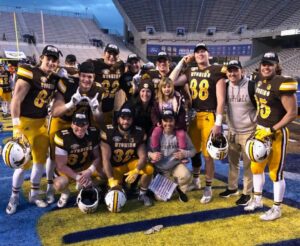
 Shannon is such a fun-loving guy, and very adventurous. Among his favorite things is planning adventures for his family. This year, they went to Houston and Galveston. They also made a trip across South Dakota and Minnesota. They went camping in Casper, and in the Snowy Mountains, and Saratoga!! Lindsay tells me, “He loves to take care of us and show us something fun.” I can certainly see that in Shannon. They got on hikes to some of the most beautiful places, and their daughter, Mackenzie, their pride and joy, is so blessed to be introduced to these fun activities.
Shannon is such a fun-loving guy, and very adventurous. Among his favorite things is planning adventures for his family. This year, they went to Houston and Galveston. They also made a trip across South Dakota and Minnesota. They went camping in Casper, and in the Snowy Mountains, and Saratoga!! Lindsay tells me, “He loves to take care of us and show us something fun.” I can certainly see that in Shannon. They got on hikes to some of the most beautiful places, and their daughter, Mackenzie, their pride and joy, is so blessed to be introduced to these fun activities.
Shannon is the assistant coach for the Wyoming Cowboys football team. He is also their tight ends coach and helps with special teams too. Not only does Shannon’s family benefit from the kind of loving person Shannon is, but his players do too. Shannon and Lindsay are always doing special gatherings with the guys, many of whom 
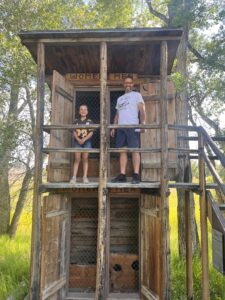 are far from home. Shannon and Lindsay really aren’t old enough, to be parental figures for the guys, but they definitely serve in the role of mentors, and the guys really appreciate that about them.
are far from home. Shannon and Lindsay really aren’t old enough, to be parental figures for the guys, but they definitely serve in the role of mentors, and the guys really appreciate that about them.
Shannon is well known for his servant’s heart. He serves his family, his friends and colleagues, and church with a glad and generous heart. That is one of Lindsay’s favorite things about him. Shannon has loved Lindsay since he first laid eyes on her, and his love for her grows deeper and deeper with each passing day. Shannon has a huge capacity for love, and his family is very blessed to have him. Today is Shannon’s birthday. Happy birthday Shannon!! Have a great day!! We love you!!
 It never really occurred to me that the formation of new states in the United States would be the huge undertaking that it actually became. I just assumed that as the settlers moved into an area, they eventually got populated enough to decide to be a state. Of course, I realized that they would have to “petition” the national government for acceptance, but that wasn’t all there was to it at all. The United States had acquired the Northwest Territory (the Midwest today) in a number of steps. First, when it was relinquished by the British. Second, extinguishment of states’ claims west of the Appalachians. And finally, usurpation or purchase of lands from the Native Americans. Originally, the Hudson’s Bay Company acquired the area under a charter from Charles II in 1670. Then, in 1869, the Canadian government bought the land from the company. The boundaries we now have were set in 1912. In 1870, Canada acquired an area known as Rupert’s Land and the North-Western Territory from the Hudson’s Bay Company for £300,000 (Canadian $1.5 million) and a large land grant.
It never really occurred to me that the formation of new states in the United States would be the huge undertaking that it actually became. I just assumed that as the settlers moved into an area, they eventually got populated enough to decide to be a state. Of course, I realized that they would have to “petition” the national government for acceptance, but that wasn’t all there was to it at all. The United States had acquired the Northwest Territory (the Midwest today) in a number of steps. First, when it was relinquished by the British. Second, extinguishment of states’ claims west of the Appalachians. And finally, usurpation or purchase of lands from the Native Americans. Originally, the Hudson’s Bay Company acquired the area under a charter from Charles II in 1670. Then, in 1869, the Canadian government bought the land from the company. The boundaries we now have were set in 1912. In 1870, Canada acquired an area known as Rupert’s Land and the North-Western Territory from the Hudson’s Bay Company for £300,000 (Canadian $1.5 million) and a large land grant.
That left the United States with a kind of dilemma, since they wanted to make sure these new states were run in the way they had originally designed. So, on July 13, 1787, Congress enacts the Northwest Ordinance, to structure the settlement of the Northwest Territory. Since the formation of new states was a new venture for  the young nation, they had to create a policy for the addition of these new states. Vitally important was the need to make sure their new nation thrived and survived. The members of Congress knew that if their new confederation were to survive intact, it had to resolve issue of the states’ competing claims to western territory.
the young nation, they had to create a policy for the addition of these new states. Vitally important was the need to make sure their new nation thrived and survived. The members of Congress knew that if their new confederation were to survive intact, it had to resolve issue of the states’ competing claims to western territory.
That said, in 1781, the state of Virginia began the process by ceding its extensive land claims to Congress. That bold move made other states more comfortable in doing the same. Thomas Jefferson first proposed a method of incorporating these western territories into the United States in 1784. His plan was to basically turn the territories into colonies of the existing states. Since each state was to have their own constitution, the ten new northwestern territories would select the constitution of an existing state that closely aligned with their own values. Once that process was complete, the new territory (colony) had to wait until its population reached 20,000 to join the confederation as a full member. That process made Congress nervous, because they feared that the new states…10 in the Northwest as well as Kentucky, Tennessee and Vermont…would quickly gain enough power to outvote the old ones, so Congress never passed Thomas Jefferson’s proposal.
It would be three more years before the Northwest Ordinance which proposed that “three to five new states be created from the Northwest Territory. Instead of adopting the legal constructs of an existing state, each territory would have an appointed governor and council. When the population reached 5,000, the residents could elect their own assembly, although the governor would retain absolute veto power. When 60,000 settlers 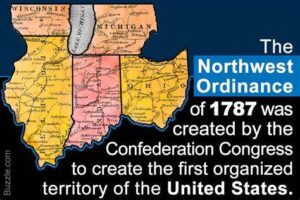 resided in a territory, they could draft a constitution and petition for full statehood. The ordinance provided for civil liberties and public education within the new territories, but did not allow slavery.”
resided in a territory, they could draft a constitution and petition for full statehood. The ordinance provided for civil liberties and public education within the new territories, but did not allow slavery.”
The last part angered the pro-slavery Southerners, but they were willing to go along with this because they hoped that the new states would be populated by white settlers from the South. They believed that although these Southerners would have no enslaved workers of their own, they would not join the growing abolition movement of the North. Of course, we all know how that played out.
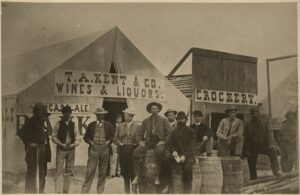 With the Westward migration in the United States, came the cowboys, and with them came the “Old West Saloons,” so that those cowboys wound have a place to wind down after a hard day’s work. We have all heard of the “Old West Cowboys” and while they were a picture of the west, it was the movies that brought them to life for most of us today. As the people moved west, many of the men came on their own at first. That brought the saloon keepers to see if they could make a buck on these men who were hungry for a little socialization. Saloons were common in almost all cities, and a few areas also had Mexican-style cantinas.
With the Westward migration in the United States, came the cowboys, and with them came the “Old West Saloons,” so that those cowboys wound have a place to wind down after a hard day’s work. We have all heard of the “Old West Cowboys” and while they were a picture of the west, it was the movies that brought them to life for most of us today. As the people moved west, many of the men came on their own at first. That brought the saloon keepers to see if they could make a buck on these men who were hungry for a little socialization. Saloons were common in almost all cities, and a few areas also had Mexican-style cantinas.
When we think of the “Old West Saloons,” we usually picture the same style. “A common wooden front with a wooden boardwalk. There were always a few hitching posts to tie a horse. Often a water source would be located close by for horses to drink. The front doors always consisted of two swinging doors that would brush up against a cowboy as he walked into the main bar area. The bar itself was very long to accommodate many standing customers. The floor area consisted of wooden tables and chairs.”
There were usually a group of men at the bar, and some at the tables playing a friendly game of poker…at least it was friendly until someone thought they were getting cheated. You put a few drinks in a guy, add to it the fact that he is losing the poker game, and it a recipe for a fight. That was how most of the violence in the towns got started…right there in the saloon and then, at times it moved out into the roadway.
We all think of the first saloons in the typical way of the movies, but that really wasn’t the case. “The first 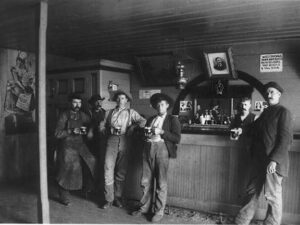 saloons were mostly tents or square wooden structures with tent material thrown over the top. The material was enough to keep the rain off the heads of their customers. The floors were not made of wood. Tent saloons never had floors of any type. If it rained, the floors were muddy, and if it was dry, they were dusty. The only thing the early saloon offered was whiskey and a place to sit and rest.”
saloons were mostly tents or square wooden structures with tent material thrown over the top. The material was enough to keep the rain off the heads of their customers. The floors were not made of wood. Tent saloons never had floors of any type. If it rained, the floors were muddy, and if it was dry, they were dusty. The only thing the early saloon offered was whiskey and a place to sit and rest.”
The first whiskey ever served in a saloon was not the fine whiskey that we all think of. In fact, New Yorkers or those from Chicago would most likely cringe at the taste of the whiskey of the Old West. Whiskey in those days was “raw and made right in the camp or town. The simple ingredients included raw alcohol, sugar burnt, and a little pouch chewing tobacco. Whiskey with terrible names like ‘Coffin Varnish,’ ‘Tarantula Juice,’ ‘Red Eye,’ and others was common among the early saloons.” Later, when the trading with the Indians, the word “Firewater” was used to describe Whiskey. It got that name because they demonstrated its potency by pouring it over the fire. With a high enough proof, the Whiskey acted like gasoline on the fire. The name stuck, and Firewater it was!! Now, the Whisky of those days was not for the “lightweight” and was not to be sipped. The people of those days expected the patrons to drink it quickly. If they didn’t, they might find themselves “drinking a 5th of Whiskey at gunpoint.” Sipping was considered a weakness, and it was not tolerated!
Everyone thinks people of that era drank a lot of beer, but that was not common. Since pasteurization was not invented yet, the bear was warm, and if you didn’t drink it fast, it would get warmer and go flat. Whiskey kept its taste and potency no matter the temperature. “It was not until the 1880s that Adolphus Busch invented artificial refrigeration and pasteurization methods to the brewing process soon after Budweiser launched as a 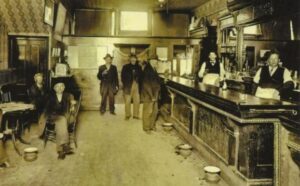 US national brand.”
US national brand.”
The first saloon was opened in the late 1820s in Bent’s Fort, Colorado. “A few little towns already had cantinas, but they did not compare to saloons that would soon spread like wildfire throughout the west. Striking gold was a big indicator that a saloon would pop up in that town. In 1848, Santa Barbara, California, only had one cantina. Yet after the discovery of gold, the town soon grew to 30 saloons. Towns like Livingston, Montana, with its 3,000 residents, had no less than 33 saloons. Back in those days, it was easy to open a business. Innovation and growth were on the incline. Saloons were profitable and with a large customer base.”

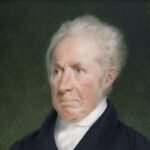 Every era has its trends. And the affluent sector of society is far more likely to go for the odd trends, to prove that they are high society, than the everyday guy. One such trend, that took place in the second half of the 18th century, was the wearing of the wig. It was considered a major status symbol. Nevertheless, by 1800, short, natural hair was all the rage again. That seems to be the problem with trends. Sometimes, they barely get started and suddenly they are over. The trend was toward the wearing of curly white wigs by gentlemen in the 18th century as part of their everyday look. Of course, many people will remember George Washington, with a nod of their head, but the reality is that George Washington never wore a wig. That was his real hair, with the addition of white powder. He, unlike many other men of that era, had a head full of red hair. He powdered it, because will he had plenty of hair to look like a wig, it was red. When Gilbert Stuart, the famous portraitist, painted the Founding Fathers, he depicted five of the first six Presidents with pure white hair. Unlike Washington, the next four Presidents, John Adams, Thomas Jefferson, James Madison and James Monroe did wear wigs, so his depiction of them was correct, and Washington wore his hair in that style, so he could look like he wore a wig without the expense of one.
Every era has its trends. And the affluent sector of society is far more likely to go for the odd trends, to prove that they are high society, than the everyday guy. One such trend, that took place in the second half of the 18th century, was the wearing of the wig. It was considered a major status symbol. Nevertheless, by 1800, short, natural hair was all the rage again. That seems to be the problem with trends. Sometimes, they barely get started and suddenly they are over. The trend was toward the wearing of curly white wigs by gentlemen in the 18th century as part of their everyday look. Of course, many people will remember George Washington, with a nod of their head, but the reality is that George Washington never wore a wig. That was his real hair, with the addition of white powder. He, unlike many other men of that era, had a head full of red hair. He powdered it, because will he had plenty of hair to look like a wig, it was red. When Gilbert Stuart, the famous portraitist, painted the Founding Fathers, he depicted five of the first six Presidents with pure white hair. Unlike Washington, the next four Presidents, John Adams, Thomas Jefferson, James Madison and James Monroe did wear wigs, so his depiction of them was correct, and Washington wore his hair in that style, so he could look like he wore a wig without the expense of one.
Trends weren’t the only reason for the wigs, however. In the 17th century, hairlines were an important aspect of fashion. It was thought that a “well-bred man” would have a good hairline. Unfortunately, in the pre- antibiotics world, syphilis was on the rise in Europe. It ultimately affected more Europeans than the Black Plague. Without antibiotics, people afflicted with syphilis suffered all the effects, including sores and patchy hair loss. That became a huge problem for men of status. Because of that, wigs were commonly used to cover up hair loss, and it wasn’t until two Kings started to lose their hair, that their use became widespread. King Louis XIV of France experienced hair loss at the early age of 17, and he hired 48 wigmakers to help combat his thinning locks. His English cousin, King Charles II, began wearing wigs a few years later, when his hair began to grey prematurely. Both conditions were indications of syphilis. A fashion was born, as courtiers started wearing wigs, and the trend trickled down to the merchant class. Of course, as we all know syphilis was not the only reason for balding, nevertheless, it could have been a bad thing to have people assuming.
antibiotics world, syphilis was on the rise in Europe. It ultimately affected more Europeans than the Black Plague. Without antibiotics, people afflicted with syphilis suffered all the effects, including sores and patchy hair loss. That became a huge problem for men of status. Because of that, wigs were commonly used to cover up hair loss, and it wasn’t until two Kings started to lose their hair, that their use became widespread. King Louis XIV of France experienced hair loss at the early age of 17, and he hired 48 wigmakers to help combat his thinning locks. His English cousin, King Charles II, began wearing wigs a few years later, when his hair began to grey prematurely. Both conditions were indications of syphilis. A fashion was born, as courtiers started wearing wigs, and the trend trickled down to the merchant class. Of course, as we all know syphilis was not the only reason for balding, nevertheless, it could have been a bad thing to have people assuming.
The wigs were called perukes. They were convenient because they were relatively easy to maintain, only needing to be sent to a wigmaker for a delousing. I’m sure that the powder, often flour, attracted every kind of bug imaginable. As wigs became more popular, they became a status symbol for people to “flaunt their wealth. An everyday wig cost 25 shillings, a week’s worth of wages for a common Londoner. The term ‘bigwig’ stems from this era, when British nobility would spend upwards of 800 shillings on wigs. In 1700, 800 shillings was approximately £40 (about $50 today) which when calculated for inflation, comes out to around £8,297 or $10,193 in today’s currency.”
Men weren’t the only ones to buy into the trend. Women, like Marie Antoinette were famous for their wigs. Military officers, especially in the British Army, also wore wigs. Some officers wore wigs, but only very specific military plait wigs, not the wigs that were bought and worn by those in high society. According to Revolutionary War Journal, “perukes were hot and heavy, extremely expensive, and constantly infected with bugs,” which was 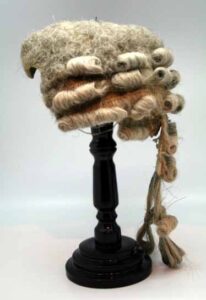
 problematic for military use. In 1706, the military officers mostly used Campaign wigs, particularly the Ramillies wig, which was named after a British victory during the War of Spanish Succession. It was a short pigtail, or “queue” tied near the scalp and at the bottom of the plait. While these queues were originally fashioned from a soldier’s real hair, fake queues quickly became the norm. Nevertheless, the wigs were hot and uncomfortable, they were often bug infested, and by 1800, people were over it. That part hasn’t changed much over the years either. As anyone who wore a wig after Chemotherapy can tell you, at some point, most people just embrace the bald, and some men even shave their heads at the first sign of balding. Another was of embracing the bald.
problematic for military use. In 1706, the military officers mostly used Campaign wigs, particularly the Ramillies wig, which was named after a British victory during the War of Spanish Succession. It was a short pigtail, or “queue” tied near the scalp and at the bottom of the plait. While these queues were originally fashioned from a soldier’s real hair, fake queues quickly became the norm. Nevertheless, the wigs were hot and uncomfortable, they were often bug infested, and by 1800, people were over it. That part hasn’t changed much over the years either. As anyone who wore a wig after Chemotherapy can tell you, at some point, most people just embrace the bald, and some men even shave their heads at the first sign of balding. Another was of embracing the bald.

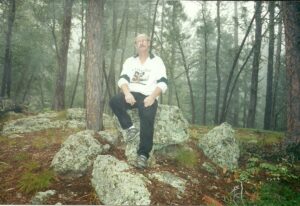 My husband, Bob Schulenberg is a workaholic. Bob retired in 2016, but that doesn’t mean that he has really retired. Bob is a mechanic, and as my version of the old saying goes, “Old mechanics never retire, they just become exhausted.” That’s Bob to a tee, because he still works too hard, but he loves what he does, so it never seems like work to him…well, almost never. If a job is giving him fits…then, it seems like work!! Nevertheless, Bob’s garage is his “home, away from home” and the house is the “break room,” especially at 4:00pm when “Mike Hammer” comes on TV. He tries really hard not to have anything scheduled, anyone coming over, or any deadline on a job that would interfere with his Four O’clock Mike Hammer Break, complete with his popcorn and maybe a glass of ice-cold tea.
My husband, Bob Schulenberg is a workaholic. Bob retired in 2016, but that doesn’t mean that he has really retired. Bob is a mechanic, and as my version of the old saying goes, “Old mechanics never retire, they just become exhausted.” That’s Bob to a tee, because he still works too hard, but he loves what he does, so it never seems like work to him…well, almost never. If a job is giving him fits…then, it seems like work!! Nevertheless, Bob’s garage is his “home, away from home” and the house is the “break room,” especially at 4:00pm when “Mike Hammer” comes on TV. He tries really hard not to have anything scheduled, anyone coming over, or any deadline on a job that would interfere with his Four O’clock Mike Hammer Break, complete with his popcorn and maybe a glass of ice-cold tea.
Bob is the kind of person who is always there to help people out. Anytime someone calls with a need, he does 
 his level best to help them out. It’s not just mechanical work either. Bob has been a longtime caregiver, working right next to me on taking care of parents, siblings, aunts, and even me. Like me, Bob wasn’t a caregiver…until he was. When our parents needed help, Bob was there to help care for them. Mostly his job was muscle, but it was much needed muscle help. If a parent fell, I would call Bob. Even when he was at work, they let him come to the rescue. That help continues these days with my aunt, Sandy Pattan. He has taken us on drives and to family gatherings, and I know it has meant the world to Aunt Sandy, and to me. He is the kind of guy you can always count on. Even if he is in the middle of something, he makes time to help those who need his help!!
his level best to help them out. It’s not just mechanical work either. Bob has been a longtime caregiver, working right next to me on taking care of parents, siblings, aunts, and even me. Like me, Bob wasn’t a caregiver…until he was. When our parents needed help, Bob was there to help care for them. Mostly his job was muscle, but it was much needed muscle help. If a parent fell, I would call Bob. Even when he was at work, they let him come to the rescue. That help continues these days with my aunt, Sandy Pattan. He has taken us on drives and to family gatherings, and I know it has meant the world to Aunt Sandy, and to me. He is the kind of guy you can always count on. Even if he is in the middle of something, he makes time to help those who need his help!!
Bob really loves being retired. He often goes bowling on Tuesday mornings, with the other retired people who like to practice year-round. Personally, I like to take the summers off, but Bob is a bowling fanatic, as anyone who knows him can tell you. I figure that it never hurts to take a break from his retirement jobs and go do 
 something else he can get frustrated with, unless he’s having a good day and really watching his mark. Bob is a really good bowler, and if he’s having a bad day, it’s usually that he isn’t watching that dreaded mark, as any bowler can tell you. Bowling is as muck a head game as it is a skill game. If you don’t keep your head in the game, you will get frustrated. I say, as long as he enjoys the game, go for it…frustration and all. Today is Bob’s 70th birthday. Happy birthday Bob!! Have a great day!! We love you!!
something else he can get frustrated with, unless he’s having a good day and really watching his mark. Bob is a really good bowler, and if he’s having a bad day, it’s usually that he isn’t watching that dreaded mark, as any bowler can tell you. Bowling is as muck a head game as it is a skill game. If you don’t keep your head in the game, you will get frustrated. I say, as long as he enjoys the game, go for it…frustration and all. Today is Bob’s 70th birthday. Happy birthday Bob!! Have a great day!! We love you!!
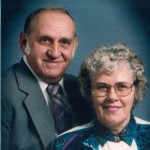
 My aunt, Jeanette Byer is an amazing woman. She refuses to let anything shut her down. She pretty much goes non-stop. You might think that’s not such a big deal, but my Aunt Jeanette is 88 years old…she just acts like she 60, or maybe she has convinced herself that she is. To make matters worse, Aunt Jeanette’s eyesight is failing, with Macular Degeneration. Many people would just sit down and quit in that situation, but Aunt Jeanette just keeps plugging along. Whatever it is, it works for her. Every day, she heads out to goes for a walk around her apartment complex…twice. If the weather is too cold, windy, or stormy, she just walks the halls of the building. I am so proud of how hard she works to stay independent. That isn’t an easy thing as we get older. Staying active and independent is a lot of work. You can’t take many days off, or you will never get back. Aunt Jeanette doesn’t take days off. She goes and goes. The words “give up” are just not in her vocabulary.
My aunt, Jeanette Byer is an amazing woman. She refuses to let anything shut her down. She pretty much goes non-stop. You might think that’s not such a big deal, but my Aunt Jeanette is 88 years old…she just acts like she 60, or maybe she has convinced herself that she is. To make matters worse, Aunt Jeanette’s eyesight is failing, with Macular Degeneration. Many people would just sit down and quit in that situation, but Aunt Jeanette just keeps plugging along. Whatever it is, it works for her. Every day, she heads out to goes for a walk around her apartment complex…twice. If the weather is too cold, windy, or stormy, she just walks the halls of the building. I am so proud of how hard she works to stay independent. That isn’t an easy thing as we get older. Staying active and independent is a lot of work. You can’t take many days off, or you will never get back. Aunt Jeanette doesn’t take days off. She goes and goes. The words “give up” are just not in her vocabulary.
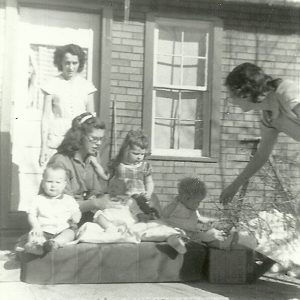
Aunt Jeanette is always a happy and smiling person. She is always trying to make sure that everyone has what they need to make them comfortable and happy too. Aunt Jeanette is a social person and enjoys social exchanges with other people in her building. She has been known to sit in a chair near the apartment complex entrance, and simply start up a conversation with the people in the building. Some people say, “Hello” and simply move on, but some will sit and visit with her. She like making new friends, and that is a perfect way to “get the ball rolling” on a new friendship. Sometimes it might take a few tries, but once people get past the initial surprise of having a random person start talking to them, they begin to feel comfortable with it and a new friendship is made. I’m sure lots of people might find this strange…at least until they realize that they now have a new friend. Too many people are so isolated in their own little world, that these social situations slip past them unnoticed, and later they wish they had not been such an isolationist.
Aunt Jeanette loves to go to the casinos. The flashing lights, clanging bells, and, the possibility of 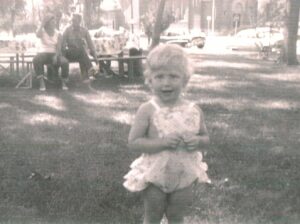
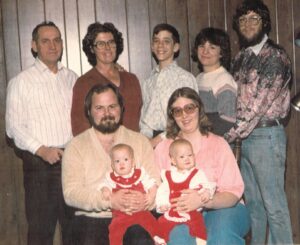 that “big win” are a fun break from the everyday. Because she is a social person, the casino satisfies her need to be with people too. She isn’t a gambling addict. She just enjoys the occasional game of chance. There’s nothing wrong with that. It’s a nice outing for her and her daughter, Tina Grosvenor. They head out and make a day of it. I’m glad Tina takes her mom to have a little fun. Today is Aunt Jeanette’s 88th birthday. Happy birthday Aunt Jeanette!! Have a great day!! We love you!!
that “big win” are a fun break from the everyday. Because she is a social person, the casino satisfies her need to be with people too. She isn’t a gambling addict. She just enjoys the occasional game of chance. There’s nothing wrong with that. It’s a nice outing for her and her daughter, Tina Grosvenor. They head out and make a day of it. I’m glad Tina takes her mom to have a little fun. Today is Aunt Jeanette’s 88th birthday. Happy birthday Aunt Jeanette!! Have a great day!! We love you!!

 My cousin, Elmer Johnson told me about his dad’s mischievous past a few years ago, and while he told me of a few stories, my imagination can run wild on the other things the boys must have tried too. Anytime you get three brothers, or in this case, the two oldest brothers, you have a recipe for…mischief. I don’t have brothers, but I do have four sisters, and I can tell you that we could think of some crazy stuff too. Well, not a crazy as my Uncle Elmar and his brother, Les. Those guys lived out in the country, and they had a lot of time on their hands…when their chores were done, anyway. I think that few things could compare to the time their dad went into the outhouse (common back then). That was when Uncle Elmer and his brother Les got an idea. Uncle Elmer drove the tractor right up by the outhouse. His brother Les hit the outhouse with a 2×4 as Uncle Elmer revved up the engine. Their dad came running out of the outhouse with his pants down around his ankles and the Montgomery Ward’s catalog in his hand. Their dad wasn’t very happy with them, but he was relieved that the outhouse made it through whole ordeal in good shape…and that he did too!! Every time I think about that story, I can’t help but laugh.
My cousin, Elmer Johnson told me about his dad’s mischievous past a few years ago, and while he told me of a few stories, my imagination can run wild on the other things the boys must have tried too. Anytime you get three brothers, or in this case, the two oldest brothers, you have a recipe for…mischief. I don’t have brothers, but I do have four sisters, and I can tell you that we could think of some crazy stuff too. Well, not a crazy as my Uncle Elmar and his brother, Les. Those guys lived out in the country, and they had a lot of time on their hands…when their chores were done, anyway. I think that few things could compare to the time their dad went into the outhouse (common back then). That was when Uncle Elmer and his brother Les got an idea. Uncle Elmer drove the tractor right up by the outhouse. His brother Les hit the outhouse with a 2×4 as Uncle Elmer revved up the engine. Their dad came running out of the outhouse with his pants down around his ankles and the Montgomery Ward’s catalog in his hand. Their dad wasn’t very happy with them, but he was relieved that the outhouse made it through whole ordeal in good shape…and that he did too!! Every time I think about that story, I can’t help but laugh.
Kids do crazy things, and they have no fear of reprisal…except that of their parents, obviously. So, the trick is to know how far you can go with your parents. Make sure they have a good sense of humor, and don’t mind admitting that they’ve been had. I have a feeling that their dad had pulled a few of the same, or similar pranks on his parents that Uncle Elmer and Les, and later Tom pulled on theirs. These days, kids play video games and watch television, but in those days, kids had to create their own games and adventures. Kids who lived on farms knew how to drive tractors, and probably pickup trucks, at an early age…way before city kids. Some, like my dad and his brother even knew how to use dynamite. And they got creative in their pranks, to say the least. It might seem strange to us, but I’ll bet those guys had the time of their lives.
Uncle Elmer was also an amazing cook. My cousin, Ellen Bremner, his oldest child told me about holiday meals at their house. Holidays were one of the times the kids cherished the most. Their dad, my Uncle Elmer, making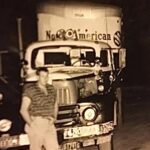
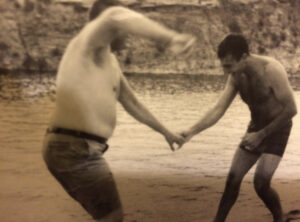 a wonderful holiday meal from scratch, with everyone in the family standing there watching and smelling that wonderful meal…their mouths watering and stomachs growling. Dinner couldn’t come soon enough. Uncle Elmer liked to experiment with his cooking, something that their mom, my Aunt Dee, really didn’t do. It’s hard for me to imagine Uncle Elmer as a chef, but I think I wish I could have tasted that food. Today would have been Uncle Elmer’s 91st birthday. Happy birthday in Heaven, Uncle Elmer. We love and miss you very much.
a wonderful holiday meal from scratch, with everyone in the family standing there watching and smelling that wonderful meal…their mouths watering and stomachs growling. Dinner couldn’t come soon enough. Uncle Elmer liked to experiment with his cooking, something that their mom, my Aunt Dee, really didn’t do. It’s hard for me to imagine Uncle Elmer as a chef, but I think I wish I could have tasted that food. Today would have been Uncle Elmer’s 91st birthday. Happy birthday in Heaven, Uncle Elmer. We love and miss you very much.


 My brother-in-law, Chris Hadlock has been having a very busy summer this year, and it doesn’t look like it will slow down anytime soon either. For Chris, that is ok, because he loves living on the property where he grew up, and working on it is truly a “labor of love” for him. Chris and my sister, Allyn Hadlock bought the place after his parents had passed away, and they have been fixing it up ever since. I know his parents would be so pleased with how amazing it looks. They loved that place, and to have their son and his wife living on it and sharing it with the family, keeping the dream in the family would mean the world to them.
My brother-in-law, Chris Hadlock has been having a very busy summer this year, and it doesn’t look like it will slow down anytime soon either. For Chris, that is ok, because he loves living on the property where he grew up, and working on it is truly a “labor of love” for him. Chris and my sister, Allyn Hadlock bought the place after his parents had passed away, and they have been fixing it up ever since. I know his parents would be so pleased with how amazing it looks. They loved that place, and to have their son and his wife living on it and sharing it with the family, keeping the dream in the family would mean the world to them.
Over the years, the house and garage fell into disrepair, and so they removed the doublewide mobile home and built a beautiful two-story house in its place. Now it is time for the garage. Chris, with the help of brothers-in-law, Mike Reed and Mike Stevens, as well as their son, Ryan Hadlock and Ryan’s son, Ethan Hadlock are in the process of building a new garage…his dream garage!! The old one had to be torn down, because it was in “less than great shape!!” First, they built a retaining wall, which has been a big job, in and of itself. Ethan helped a lot with that process!! He became quite adept at driving the tractor.
Withe the arrival of Independence Day, and the week before, Ryan; his wife, Chelsea; and their kids, Ethan and Aurora went camping at Chris and Allyn’s mountain property. Chris decided to take some time off near the 4th of July, so they could join the family on the mountain for the weekend. Daughter; Lindsay Moore; her husband, Shannon; and daughter, Mackenzie joined the family on the mountain too. Then, the family were joined by 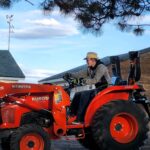

 daughter, Kellie Hadlock; her partner, Tim Thompson; as well as the rest of the family for the fireworks display at the Event Center, and again for dinner on Friday night. Daughter, Jessi Sawdon; her husband, Jason; and daughter, Adelaide were in Michigan with Jason’s family this year, so they couldn’t join the family, and they were greatly missed.
daughter, Kellie Hadlock; her partner, Tim Thompson; as well as the rest of the family for the fireworks display at the Event Center, and again for dinner on Friday night. Daughter, Jessi Sawdon; her husband, Jason; and daughter, Adelaide were in Michigan with Jason’s family this year, so they couldn’t join the family, and they were greatly missed.
Somewhere in between all the activity, the men found time to cut down a couple of dead trees in the back yard! Now, that comment coming from Allyn, caused quite a stir when their daughter, Lindsay commented, “Ummmm!! Kellie and I also ran a chain saw and a cutter, Mom!! The ladies were valuable contributors!!” And a quick recovery from Allyn, “Oh yes!! Thanks for chiming in Lindsay!! We did help also with all the clean-up of the trees!!” We really can’t leave the ladies out of this. The property by the river may be owned by Chris and Allyn, but it is an always will be a “Hadlock Family Project!!” Oh, and the building materials for the garage were delivered last week!! Chris was so excited!!
Lindsay also pointed out a “not often-seen side” of Chris…the “Grandpa Side.” Lindsay tells me, “Grandpa is very tender towards his grandkids. He loves them and wants to take care of them!! I’ve enjoyed watching his relationship with Mackenzie grow. He likes to spend time with her and show her an adventure!! And really for all of us, he’s a really good Dad! He loves us dearly and it shows!! He is always there for us. He is always up for a travel adventure…camping, going to games, beach trips, you name it!! He loves an adventure with his family!!” With Lindsay’s husband, Shannon being a coach for the Wyoming Cowboys, Chris and Allyn have been 

 going to games as much as they can. One game was the Wyoming-Air Force game, where they had field passes!! They had a great time!! Today is Chris’ birthday. Happy birthday Chris!! Have a great day!! We love you!!
going to games as much as they can. One game was the Wyoming-Air Force game, where they had field passes!! They had a great time!! Today is Chris’ birthday. Happy birthday Chris!! Have a great day!! We love you!!
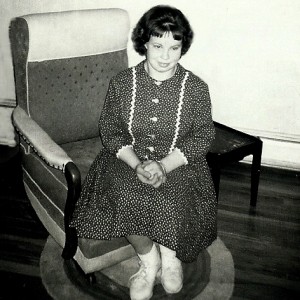
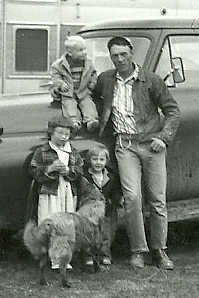 My sister-in-law, Marlyce Schulenberg…oh, I still miss her!! Even after all these years. Marlyce left us on August 13, 1989, after a battle with Cancer. I can’t believe she has been gone for 35 years now. She was just 39 years old. Marlyce was Developmentally Disabled, but that didn’t hold her back. She loved to bake, knit, and work. She almost always had a job, and her jobs were the highlight of her days…when she wasn’t loving on her nieces and nephews, that is. She did love the babies. Marlyce was the oldest of my in-laws six children, and so she was around babies much of her life. Being Developmentally Disabled meant that Marlyce never grew to adulthood, mentally anyway. She was more than just a “kid at heart,” she was a kid in her mind too. And that meant that all the kids love being around her. She was an adult, that wasn’t really an adult.
My sister-in-law, Marlyce Schulenberg…oh, I still miss her!! Even after all these years. Marlyce left us on August 13, 1989, after a battle with Cancer. I can’t believe she has been gone for 35 years now. She was just 39 years old. Marlyce was Developmentally Disabled, but that didn’t hold her back. She loved to bake, knit, and work. She almost always had a job, and her jobs were the highlight of her days…when she wasn’t loving on her nieces and nephews, that is. She did love the babies. Marlyce was the oldest of my in-laws six children, and so she was around babies much of her life. Being Developmentally Disabled meant that Marlyce never grew to adulthood, mentally anyway. She was more than just a “kid at heart,” she was a kid in her mind too. And that meant that all the kids love being around her. She was an adult, that wasn’t really an adult.
Of course, because Marlyce was Developmentally Disabled, her siblings found that she didn’t necessarily outgrow the “fighting with siblings” stage, and there wasn’t a one of them who was opposed to aggravating 
 Marlyce once in a while…or more often, for some. They loved to pick on her, but when the chocolate chip cookies were ready, they all wanted some. Of course, that was when Marlyce tried to exact her revenge…not that they couldn’t sweet-talk her out of the cookies eventually. A promise to “be nice” could go a long way toward getting back in Marlyce’s good graces.
Marlyce once in a while…or more often, for some. They loved to pick on her, but when the chocolate chip cookies were ready, they all wanted some. Of course, that was when Marlyce tried to exact her revenge…not that they couldn’t sweet-talk her out of the cookies eventually. A promise to “be nice” could go a long way toward getting back in Marlyce’s good graces.
Marlyce loved animals too. As a child, she has a dog named Brownie. She and Brownie were constant companions. I think Marlyce must have been five or so, and Brownie was quite likely the best babysitter a girl could have. Little kids are prone to getting in trouble, and wandering off, and those who are Developmentally Disabled are even more likely, so having Brownie as a constant companion probably kept Marlyce out of trouble more than once. The family mostly lived out in the country, so getting lost could have been really bad. Snakes and other animals could 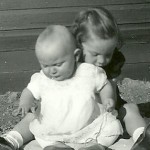
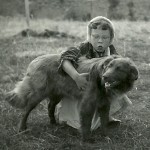 have been bad too. For Marlyce, having a “bodyguard” like Brownie was a huge help, especially to her parents, Walt and Joann Schulenberg, who were busy with three little ones in those years. Brownie was the family dog, of course, but the reality is that Brownie knew that Marlyce needed him the most of all the kids, plus she was the oldest, and Brownie had known her the longest. It was a wonderful relationship, and I’m glad they had each other, and that they are together in Heaven now. Today would have been Marlyce’s 74th birthday. Happy birthday in Heaven, Marlyce. We love and miss you very much.
have been bad too. For Marlyce, having a “bodyguard” like Brownie was a huge help, especially to her parents, Walt and Joann Schulenberg, who were busy with three little ones in those years. Brownie was the family dog, of course, but the reality is that Brownie knew that Marlyce needed him the most of all the kids, plus she was the oldest, and Brownie had known her the longest. It was a wonderful relationship, and I’m glad they had each other, and that they are together in Heaven now. Today would have been Marlyce’s 74th birthday. Happy birthday in Heaven, Marlyce. We love and miss you very much.
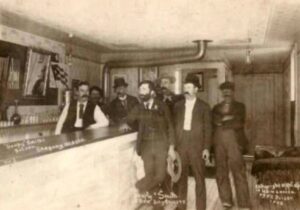 Jefferson Randolph Smith was born in Georgia in 1860. As a child, he had just as much promise as any other child of that era, but Georgia wasn’t where he wanted to live his life. Maybe it was a little too tame, or maybe it was just too settled. Smith wanted something new and exciting, so as a young man, he went west. Upon his arrival in Texas, he found work as a cowboy. That was all good for a while, but Smith soon got tired of the hard work and low wages offered by the cowboy life. Basically, he was lazy, and he decided to find a different way to make a living…one that required a lot less physical labor. Smith soon discovered that he could make more money with less effort by convincing gullible westerners to part with their cash in clever confidence games. His days as a con artist began.
Jefferson Randolph Smith was born in Georgia in 1860. As a child, he had just as much promise as any other child of that era, but Georgia wasn’t where he wanted to live his life. Maybe it was a little too tame, or maybe it was just too settled. Smith wanted something new and exciting, so as a young man, he went west. Upon his arrival in Texas, he found work as a cowboy. That was all good for a while, but Smith soon got tired of the hard work and low wages offered by the cowboy life. Basically, he was lazy, and he decided to find a different way to make a living…one that required a lot less physical labor. Smith soon discovered that he could make more money with less effort by convincing gullible westerners to part with their cash in clever confidence games. His days as a con artist began.
Smith liked swindling people, and one of his earliest methods was the “prehistoric man” of Creede, Colorado. Somehow, Smith obtained a 10-foot statue of a primitive looking human that he secretly buried near the town of Creede. Then a while later, he went back and uncovered the statue…with the addition of as much fanfare and publicity as he could muster. Once the trap was set, he began charging the public huge fees to see it. Of course, he knew it wasn’t going to take long for the public to catch on, so he wisely left town before the curious turned suspicious. I can’t imagine if he had stayed and got caught.
The nickname, “Soapy” actually came from one of his more conventional confidence games. Smith took to 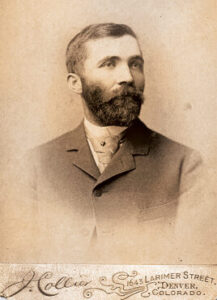 traveling around the Southwest, where he would briefly set up shop in the street selling bars of soap wrapped in blue tissue paper. The con came in when he promised the amazed crowds that a few lucky purchasers would find a $100 bill wrapped inside a few of the $5 bars of soap. Of course, there really were no $100 bills…at least not more than one. So, one of the first people to buy, would suddenly shout with pleasure and then would happily display a genuine $100 bill. Immediately, everyone else wanted a bar of the soap. Sales skyrocketed after that. The lucky purchaser, of course, was a plant, so Smith got his money back. Well, I’m sure he left town pretty quickly after that scam too.
traveling around the Southwest, where he would briefly set up shop in the street selling bars of soap wrapped in blue tissue paper. The con came in when he promised the amazed crowds that a few lucky purchasers would find a $100 bill wrapped inside a few of the $5 bars of soap. Of course, there really were no $100 bills…at least not more than one. So, one of the first people to buy, would suddenly shout with pleasure and then would happily display a genuine $100 bill. Immediately, everyone else wanted a bar of the soap. Sales skyrocketed after that. The lucky purchaser, of course, was a plant, so Smith got his money back. Well, I’m sure he left town pretty quickly after that scam too.
When the Alaskan Gold Rush began, Smith headed north in 1897 to join in, but as with any other job, he had no intention of actually mining for gold. He eventually landed in the rough frontier town of Skagway and prepared to set up shop. Skagway was “short on law and long on gold dust,” making it a great place for Smith to perfect his con games. Before long, he became the head of an “ambitious criminal underworld” and fleeced thousands of gullible miners, along with his partners. As Smith’s reputation and his “con artist success” grew, the honest citizens of Skagway grew quite angry at being taken in. They were trying to build an upstanding community, after all. So, they formed a vigilante “Committee of 101” in an attempt to bring law and order to the town. Smith was quite emboldened by then, so he formed a gang of his own, named “Committee of 303” to oppose them the vigilantes.
On July 8, 1898, Smith tried to crash a vigilante meeting on the Skagway wharf. His intention was to use his “con-man skills” to persuade them that he posed no threat to the community. Now that would have been a 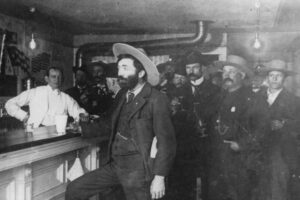 good con…if he could have pulled it off. However, Smith had failed to realize just how angry the vigilantes were. When he tried to break through the crowd, Frank Reid, a Skagway city engineer, confronted him. First, the men quarreled, then they exchanged bullets. Reid shot “Soapy” Smith dead on the spot, but not before Smith had badly wounded him. Reid died 12 days later.
good con…if he could have pulled it off. However, Smith had failed to realize just how angry the vigilantes were. When he tried to break through the crowd, Frank Reid, a Skagway city engineer, confronted him. First, the men quarreled, then they exchanged bullets. Reid shot “Soapy” Smith dead on the spot, but not before Smith had badly wounded him. Reid died 12 days later.
The funeral service for “Soapy” Smith was held in a Skagway church he had donated funds to help build. The minister chose as the text for his sermon a line from Proverbs 13: “The way of transgressors is hard.” I guess it went without saying that “the way of a con man can be death.”

